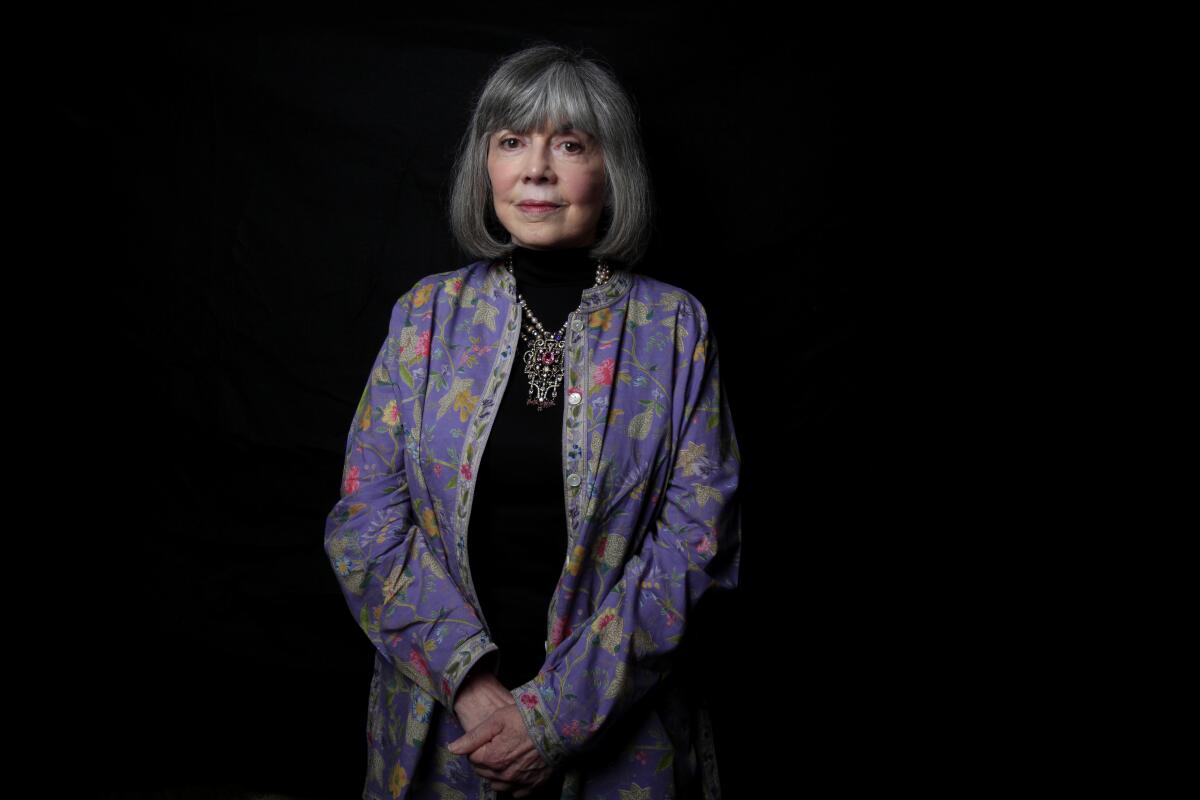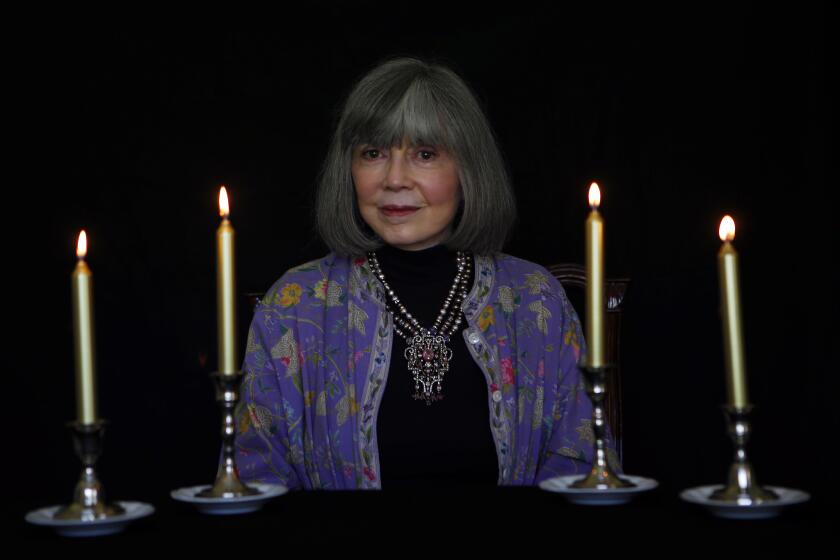Anne Rice, author of ‘Interview With the Vampire,’ dies at 80

- Share via
Anne Rice, the novelist whose “Interview With the Vampire” and other lush, bestselling gothic tales reinvented the blood-drinking immortal as tragic antihero, has died. She was 80.
Rice died due to complications from a stroke, her son, Christopher Rice, announced on her Facebook page and his Twitter page without disclosing the location.
“As a writer, she taught me to defy genre boundaries and surrender to my obsessive passions,” wrote Christopher Rice, who’s also an author. “In her final hours, I sat beside her hospital bed in awe of her accomplishments and her courage.”
Rice’s 1976 novel “Interview With the Vampire“ was later adapted, with a script by Rice, into the 1994 movie directed by Neil Jordan and starring Tom Cruise and Brad Pitt. It’s also set to be adapted again in an upcoming TV series on AMC and AMC+ set to premiere next year.
When Anne Rice published “Interview With the Vampire” in 1976, she didn’t just launch her own vampire series — her sexy tragic vampire antiheroes launched an entirely new genre.
“Interview With the Vampire,” in which reporter Daniel Molloy interviews Louis de Pointe du Lac, was Rice’s first novel. Over the next five decades, she would write more than 30 books and sell more than 150 million copies worldwide. Thirteen of those were part of the “Vampire Chronicles“ begun with her 1976 debut. Long before “Twilight” or “True Blood,” Rice introduced sumptuous romance, female sexuality and queerness — many took “Interview With the Vampire” as an allegory for homosexuality — to the supernatural genre.
“I wrote novels about people who are shut out [of] life for various reasons,“ Rice wrote in her 2008 memoir, “Called Out of Darkness: A Spiritual Confession.” “This became a great theme of my novels — how one suffers as an outcast, how one is shut out of various levels of meaning and, ultimately, out of human life itself.“
Reaction to Rice’s death was as eclectic as the wide-ranging fan base that the author had built over decades. “Your Mom wrote some dope stories — and her work will always be part of my personal journey,” Thandiwe Newton, the “Westworld” actor who played Yvette in “Interview With the Vampire,” wrote in response to Christopher Rice’s Twitter announcement.
“The Monster of Her Age” author Danielle Binks tweeted: “Anne Rice was an author who had a really complicated (and fascinating) relationship with fans and fandom … but she leaves behind quite the literary legacy, that helped pull a genre and monster into the modern-era.”
Born Howard Allen Frances O’Brien in 1941, Rice was raised in New Orleans, where many of her novels were set. Her father worked for the postal service but made sculptures and wrote fiction on the side. Her older sister, Alice Borchardt, also wrote fantasy and horror fiction. Rice’s mother died when Rice was 15.
Raised in an Irish Catholic family, Rice initially imagined herself becoming a priest (before she realized women weren’t allowed) or a nun.
In 1961, she married the poet Stan Rice, who died in 2002. They lived amid the bohemian scene of the Haight-Ashbury in 1960s San Francisco, where Rice described herself as “a square,” typing away and studying writing at San Francisco State University while everyone else partied. Together they had two children: Christopher and Michelle, who died of leukemia at 5 in 1972.
It was while grieving Michelle’s death that Rice wrote “Interview With the Vampire,“ turning one of her short stories into a book. Rice traced her fascination with vampires back to the 1934 film “Dracula’s Daughter,” which she saw as a young girl.
Though Rice had initially struggled to get it published, “Interview With the Vampire” was a massive hit, particularly in paperback. She didn’t immediately extend the story, following it up with a pair of historical novels and three erotic novels penned under the pseudonym A. N. Roquelaure. (Rice would later declare, in a 2014 Times interview with Carolyn Kellogg: “What I write is out-and-out pornography. I think it’s a fine word. The only reason I don’t use it more often is it gets all misunderstood, and people want to call it erotica.”)
In 1985 she published “The Vampire Lestat,” about the “Interview With the Vampire” character she would return to in books as recent as 2018’s “Blood Communion: A Tale of Prince Lestat.”
In Rice’s “Vampire Chronicles,” some critics saw only cheap eroticism. But others — including millions of readers — saw the most consequential interpretation of vampires since Bram Stoker.
“Let me suggest one reason why the books found a mass audience. They were written by someone whose auditory and visual experiences shaped the prose,“ Rice wrote in her memoir. “I am a terrible reader. But my mind is filled with these auditory and visual lessons and, powered by them, I can write about five times faster than I can read.”
Rice often wrote about her fluctuating spiritual journey. Her memoir — written after she sold her 47,000-square-foot New Orleans mansion and moved to Rancho Mirage — was part of her attempt to build a reputation as a serious Christian writer.
“My son Christopher suggested it,” she told The Times of the move. “He said, if you want to live in a place where the sky is blue 350 days out of the year, it’s the Palm Springs area. And so I came out here and fell in love.”
In the Coachella Valley, she said she hoped “to take the tools, the apprenticeship, whatever I learned from being a vampire writer, or whatever I was — to be able to take those tools now and put them in the service of God is a wonderful, wonderful, wonderful opportunity,” she told Cain Burdeau in a 2008 Times interview. “And I hope I can redeem myself in that way. I hope that the Lord will accept the books I am writing now.”
But by 2010, she was announcing that she was no longer Christian, saying in a Times interview: “I’ve come to the conclusion from my experience with organized religion that I have to leave, that I have to, in the name of Christ, step away from this. It’s a matter of rejecting what I’ve discovered about the persecution of gays, the persecution and oppression of women, and the actions of the churches on many different levels. I’ve also found that I can’t find a basis in Scripture for a lot of the positions that churches and denominations take today, and I can’t find any basis at all for an anointed, hierarchical priesthood.”
When asked if there was a single moment that led to her departure from Christianity, she cited several subjects, including Catholic Church positions on gay marriage and the AIDS epidemic. “But the real last straw, the very last straw, was the bishop of Phoenix, Ariz., Thomas Olmsted, coming out and publicly condemning a nun named Sister Margaret McBride for authorizing a life-saving abortion for a dying mother in a Phoenix hospital,” she told The Times’ Mitchell Landsberg. “What he said in essence was that she had excommunicated herself by authorizing the abortion, and I could write a book on why I think that was a ruthless and immoral decision.”
In 2014, after an 11-year break from her vampire franchise and the ascendancy of “Twilight” and “True Blood” as objects of pop culture fandom, Rice brought her vampires back with the novel “Prince Lestat,” and in the process reflected more on her Catholic upbringing. “I’ll never entirely get over the damage done to me by the Catholic attitude toward sex,” she told The Times. “The hatred of sex, the loathing of it and the denial of the loathing of it.”
Rice’s longtime editor, Victoria Wilson, recalled her as “a fierce storyteller who wrote large, lived quietly, and imagined worlds on a grand scale.“
“She summoned the feelings of an age long before we knew what they were,“ Wilson said in a statement. “As a writer, she was decades ahead of her time.”
Rice will be interred during a private ceremony at a family mausoleum in New Orleans, her family said. A public celebration will be planned for next year in New Orleans. “Ramses the Damned: The Reign of Osiris,” a novel Rice wrote with her son, Christopher, will be published in February.
The Associated Press and Times staff writer Christi Carras contributed to this report.
More to Read
Start your day right
Sign up for Essential California for the L.A. Times biggest news, features and recommendations in your inbox six days a week.
You may occasionally receive promotional content from the Los Angeles Times.







